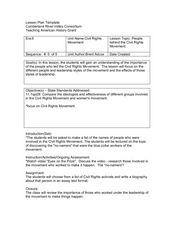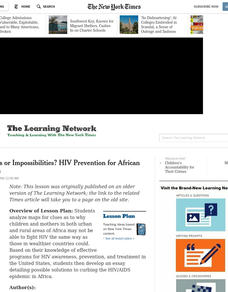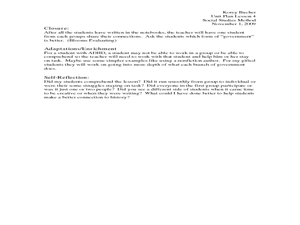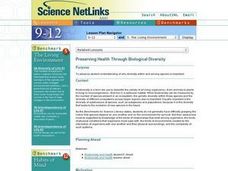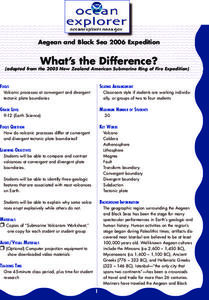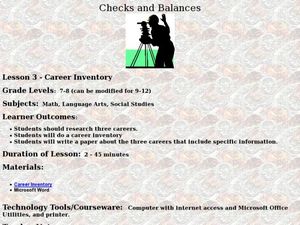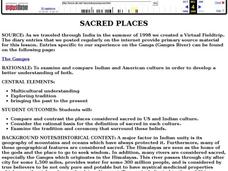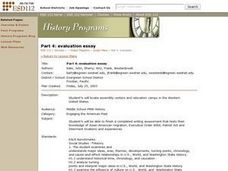Curated OER
Human VS Animal Skeletons
Students research and compare human and animal skeletons. They identify human skeletons basic functions and parts.
Curated OER
Countries of South America
Young scholars focus on the geography of the countries of South America. Using a map, they identify the European countries who claimed the South American countries and research the influences they had on South America. To end the...
Curated OER
The Electric Hearth
Students examine popular media. For this media awareness lesson, students keep logs of their interactions with media and then write an essay regarding the data.
Curated OER
People behind the Civil Rights Movement
Students identify the people actively involved in the Civil Rights Movement. In this United States History instructional activity, students watch the video "Eyes on the Prize" then participate in a class discussion about the video. ...
Curated OER
Monkey See, Monkey Do
Students consider the influence of bullies and map the social ecosystem of their schools. They create lifelines that compare baboon and human development and write an essay that considers the relationship between psychosocial development...
Curated OER
The Armenian Genocide: The American Ambassador in Constantinople
Students analyze America's reaction to the Armenian Genocide. They write a journal response, read and discuss text, compare/contrast reactions around the world to the Armenian Genocide and the genocide in Rwanda, and write an essay.
Curated OER
Solutions or Impossibilities? HIV Prevention for African Children
Students analyze maps for clues as to why students and mothers in both urban and rural areas of Africa may not fight HIV the same way as those in wealthier countries. They write an essay outlining solutions to the AIDS epidemic.
Curated OER
The Sounds of Samba
Young scholars research the origins of Samba in Brazil using the internet. After defining new vocabulary, they locate the cities in Brazil using latitude and longitude which practice the Samba. In groups, they compare and contrast the...
Curated OER
Where is the Trail? The Journey of Lewis and Clark
Students explore the trail followed by Lewis and Clark on their journey across the United States. In this United States History instructional activity, students complete several activities to establish the Lewis and Clark Expedition,...
Curated OER
Types of Branches
Fourth graders study the three branches of government. In this politics instructional activity, 4th graders list the three branches of government, understanding what each branch does, and compare and contrast how government is...
Curated OER
Preserving Health Through Biological Diversity
Learners research and explore the benefits of biodiversity, particularly as it relates to human health. They write an essay in which they explain the possible effect of human activities on the emergence of new diseases.
Curated OER
Risks and Benefits
Students research and discuss the risks and benefits of cell phones and driving. They analyze the mechanical and administrative causes of the accident of the Space Shuttle Challenger. They write an essay explaining the risks and benefits...
Curated OER
Culture - Unit on Religion and Globalization
Students examine the impact of religious beliefs on perspectives about globalization. They watch and discuss a video, identify the role of the International Monetary Fund, read and discuss articles, and write an essay.
Curated OER
What's the Difference?
Students investigate volcanic processes at convergent and divergent
tectonic plate boundaries. They read and analyze diagrams, complete a worksheet, and write an essay.
Curated OER
What's in the Water?
Young scholars make a water sampler and use proper techniques to collect water.They write a essay explaining the inter-relationship of factors such as temperature, pH, dissolved oxygen, nitrates, and phosphates in a lake that might cause...
Curated OER
Whose Manifest Destiny?
Students examine the Westward expansion. In this North American settlers lesson, students will view a PowerPoint presentation and answer critical thinking questions. Students will write an essay that analyzes the impact of westward...
Curated OER
Globalization 101
Students reflect on how religion has played a major role in globalization. In this lesson, students visit multiple internet sites, then participate in a class discussion on the various ideas on globalization that they learned in...
Curated OER
Career Inventory
Students research three careers and write an essay in which they give specific information about each. In this career activity, students use career finder to discover information about three careers. Students will discuss each career in...
Curated OER
Cast of Characters Lesson Plan: Comparing Artists
Students choose an artist, examine a painting, read a statement of the artist and their biography. They research the artist using the World Wide Web, books, encyclopedias, art, prints or magazines. They write an essay using their notes.
Curated OER
Sacred Places
Students examine places considered sacred in both India and the U.S. They read and discuss a website on the Ganges River, discuss places considered sacred in the U.S., and write an essay comparing/contrasting personal sacred places and...
Curated OER
Evaluation Essay
Middle schoolers write an essay about previous studied lessons that is applied to the Japanese American experience. They have to role play being a Caucasian, or Nisei in California at a given time based on what they have studied. What...
Curated OER
Health Conscious?
What is your attitude on health and illness? By considering their own experiences, students will reflect on and discuss their attitudes toward health and illness while educating each other by researching illnesses in small groups,...
Curated OER
Macbeth Essay
In this Macbeth essay worksheet, students read the first two acts of Macbeth and then write a comparison essay of the acts. Students follow the given structure to complete the assignment.
Curated OER
Comparing the Ancient and Modern Olympics: A Venn Diagram
Students compare and contrast today's Olympic Games to those held in ancient Greece. They read newspapers, conduct Internet research, watch TV coverage of current Olympic Games and organize their findings on a Venn diagram.





